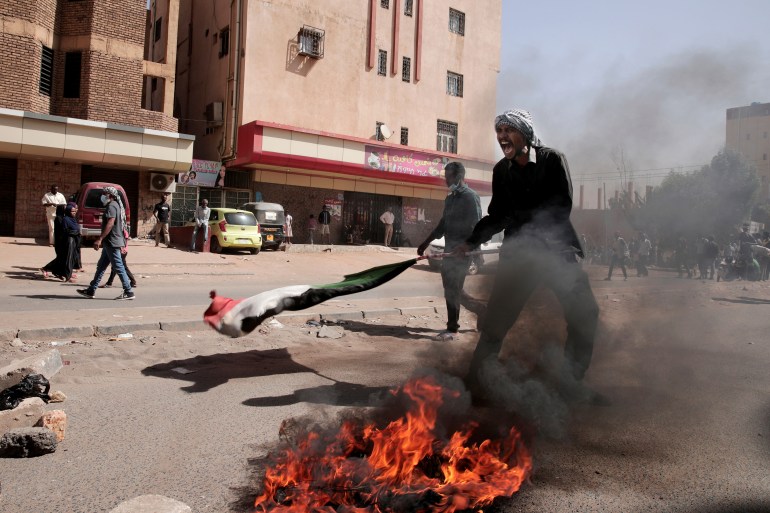Several protesters killed in Sudan anti-coup rallies | News
Sudanese security forces have killed at least three protesters during rallies against last year’s military coup, medics and an activist have said, before a visit by US diplomats seeking to revive a transition to civilian rule.
Activist Nazim Sirag said three protesters were killed on Monday when security forces opened fire to break up a march in Khartoum, The Associated Press news agency reported. He said several others were wounded by gunshots.
Three protesters “were killed by live bullets” the Central Committee of Sudanese Doctors (CCSD) said in a statement on Facebook. The group later said at least seven protesters had been killed.
Thousands of protesters demonstrating against military rule marched towards the presidential palace in the capital Khartoum, drawing volleys of tear gas from security forces, a Reuters witness said.
The protesters, who gathered some 2km (1.25 miles) from the palace, blocked a main road in the Al Diyum neighbourhood and burned tires before starting their march.
Huge crowds have regularly taken to the streets demanding a return to civilian rule since the military coup on October 25 ended a power-sharing arrangement that began after longtime ruler Omar al-Bashir was removed from power amid a popular uprising in April 2019.
The three killings on Monday bring to 67 the death toll of protesters killed since the October coup led by General Abdel Fattah al-Burhan.
The military takeover triggered wide international condemnation and derailed a fragile transition to civilian rule following al-Bashir’s removal.
 Thousands of people took to the streets to protest the October 25, 2021, coup that has plunged the country into grinding deadlock [Marwan Ali/AP Photo]
Thousands of people took to the streets to protest the October 25, 2021, coup that has plunged the country into grinding deadlock [Marwan Ali/AP Photo]The latest rallies, in Khartoum and Wad Madani to the south, came as the United States envoy to the Horn of Africa David Satterfield and Assistant Secretary of State for African Affairs Molly Phee are expected in the capital this week.
Sawsan Salah, from the capital’s twin city of Omdurman, said protesters burned car tyres and carried photos of people killed during other demonstrations since the October 25 coup.
In Wad Madani, “around 2,000 people took to the streets as they called for civilian rule,” said Emad Mohammed, a witness there.
Thousands of protesters demanded that the military return to their barracks and chanted in favour of civilian rule in North Khartoum, witnesses said.
Protesters – sometimes numbering in the tens of thousands – have regularly taken to the streets despite a deadly crackdown by security forces and periodic cuts to communications since the coup.
Al Jazeera’s Hiba Morgan, reporting from the capital, Khartoum, said protesters are trying to keep up the momentum “by turning out in the thousands on the streets to show the military that they want whatever initiative that is going to result in a pure, civilian government.
“They say that is what they have been demanding and despite the ‘brutal and excessive use of force’, as the United Nations termed it, they will continue protesting. They have scheduled more protests in the coming days,” Morgan said.
On Thursday, Sudanese authorities said protesters stabbed to death a police general, the first death among security forces.
Authorities have repeatedly denied using live ammunition in confronting demonstrators and insist dozens of security personnel have been wounded during protests that have often “deviated from peacefulness”.
Diplomatic push
Starting Monday in Riyadh, Satterfield and Phee were to meet the Friends of Sudan, a group calling for the restoration of the country’s transitional government.
The meeting aims to “marshal international support” for the UN mission to “facilitate a renewed civilian-led transition to democracy” in Sudan, the US Department of State said.
The diplomats then travel to Khartoum for meetings with pro-democracy activists, civic groups, military and political figures.
“Their message will be clear: The United States is committed to freedom, peace, and justice for the Sudanese people,” the Department of State said.
On Monday, US Secretary of State Antony Blinken announced that a new charges d’affaires Lucy Tamlyn will head the embassy in Khartoum to serve “during this critical juncture in Sudan’s democratic transition”.
The UN last week said it will launch talks involving political, military and social actors to help resolve the crisis.
The mainstream civilian faction of the Forces for Freedom and Change, the leading civilian pro-democracy group, has said it would accept the UN offer for talks if it revives the transition to civilian rule.
Proposed talks have been welcomed by the ruling Sovereign Council, which al-Burhan re-staffed following the coup with himself as chairman.
Morgan said the UN in Sudan has been trying to bring together “the various stakeholders … to try to reach some kind of a consensus so that all sides can go to a negotiating table.
“The UN has admitted this will take weeks before anything materialises if this move is successful and this all comes just hours before a visit is expected by senior US officials,” Morgan said.
Burhan has insisted that the military takeover “was not a coup” but only meant to “rectify” the course of the post-Bashir transition.
Earlier this month, Sudan’s civilian prime minister Abdalla Hamdok resigned saying the country was now at a “dangerous crossroads threatening its very survival”.

Pingback: read more
Pingback: cam coins
Pingback: Mostbet
Pingback: Finalshell